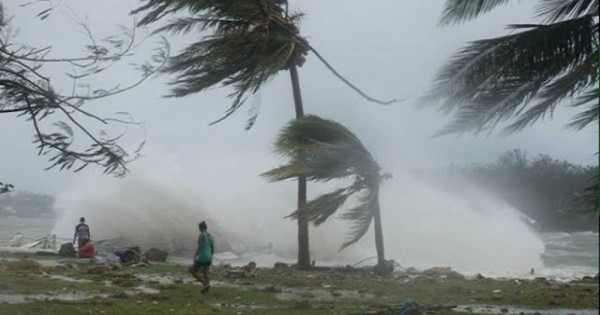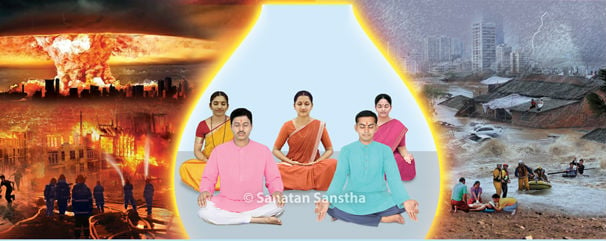In May and June, India had to face the powerful cyclones ‘Amphan’ and ‘Nisarga’. On 20.5.2020, East coast of India was hit by ‘Amphan’, while on 2nd and 3rd June 2020, the Konkan coast (including Mumbai) was hit by ‘Nisarga’.
These cyclones, with strong winds and torrential rains, uprooted even huge trees. The collapse of walls of houses, blowing of the roofs, etc. caused huge financial losses. Numerous people became homeless. The power supply was disrupted due to breakdowns in many places. Mobile networks were down and the communication system was also cut off. Public life was completely disrupted. Citizens were horrified to witness this dreadful form of nature.
It is not possible to predict when we will have to deal with natural disasters such as hurricanes, heavy rains, earthquakes. Such disasters can arise any moment. Therefore, preparedness is necessary. With this in mind, everyone should seriously follow the instructions given here.

1. Preparing for natural disasters
A. If you are building a new house, consider having a concrete roof (e.g. slab) instead of tin sheets.
B. No matter how strong is the tin shed used for roofs, the sheets get blown away by winds. Always keep sandbags on the sheets so that they do not get blown away because it is not possible to predict when will a storm arrive. (If the area of the sheets is up to 500 square feet, some bags weighing 5-10 kgs. each should be placed on the roof all around and in the center as required. These bags should be of good quality.)
C. If there are very old and dangerous trees around the house, they should be cut down, so that the house is not damaged by if trees are uprooted during storms.
D. If high tension electric lines are passing over the roads outside your building or house and there are trees nearby, rain or wind can cause the trees to fall on the lines and result in deaths. Therefore, contact the local electricity department and ask them to cut down the tree branches near the power lines.
E. Do not stand under any electrical line, nor speak on a mobile phone. Care should be taken that animals do not stand under any electrical line. In case of sparking on the lines, report to the electrical department immediately.
F. If 2-wheelers or 4-wheelers are parked under electricity poles, power lines and trees, the storm can uproot the poles and trees and damage the vehicles. Therefore, parking of vehicles, driving, etc. should not be carried out there.
G. Power supply may be interrupted indefinitely during monsoons. Therefore, lamps, candles, torches, lanterns, etc. should be kept in the house.
H. Make sure the windows and doors of the house are closed properly. If they do not close properly, they should be repaired.
I. Follow instructions issued from time to time by the administration and the weather department. Those should not be ignored.
2. Action required in case of storm warning received in advance
A. If lightweight material is lying in the courtyard, verandah, roof or balcony of the house, it should be brought inside immediately or tied properly.
B. Move the animals to a safe place.
C. Water and dry food should be stocked in the house.
D. If it is noticed that the wind speed is increasing, gas connections in the kitchen and the main valve should be turned off. It should not be turned on till the storm is over.
3. Actions required if you are at home during a storm
A. Do not go out of the house. Do not go to balconies and tin sheds. The roofs of nearby houses as well as objects, can be blown away by winds and hurt you.
B. Windows and doors of the house should be closed properly. To prevent the doors from opening automatically due to wind speed, heavy objects can be placed near the door from the inside.
C. Window glass can get broken and lead to injury. Hence, avoid standing, sleeping, etc. near the windows
D. Turn off the main switch to disconnect the power supply. Remove the plugs of electrical appliances such as TV sets, mixers, etc. from the sockets.
E. Elevators, air-conditioners, hair-dryers, etc. should not be used during this period. Avoid touching the refrigerator.
F. Sometimes rumours are spread everywhere during an emergency. So do not believe them. Information disseminated by the Government officially should be treated as true.
4. Precautions required while out of the house
A. Find a safe place to remain during a storm. Places where a large number of trees, electricity poles, etc. are not there are said to be safe. Do not stop under trees or near electric poles.
B. 2-wheelers or 4-wheelers should be parked in a safe place away from trees and electric poles. Ensure that doors and windows of 4-wheelers are properly closed. Place heavy stone-breakers under their wheels, because the winds are likely to cause vehicles to drift away.
C. Avoid touching trees and bushes lying on the roads. It is possible that power lines might have fallen on these.
D. Do not touch any electricity pole if it is wet everywhere due to rain. This is because moisture can also lead to an electric shock.
5. Actions required once the storm subsides
A. Do not leave the house until the weather becomes normal.
B. Do not touch trees in your area which might have been uprooted and power lines falling due to storms and rains. Report these to the Fire Department and Electricity Department.
C. In case of gas leakage from a cylinder in the house, turn off the main switch of the power supply. The cylinder should be placed in such a place (for example, in the balcony) so that it comes in contact with the wind. Do not switch on the electric supply if the house smells of gas.
D. If vehicles, electrical appliances as well as household items are new and insured and will be compensated for the damage caused by a natural calamity, guidance of an insurance agent should be sought. Before disposing of the damaged items, they should be photographed first and their Panchnama be carried out.
In case of natural disasters, help can be obtained by calling the National Disaster Management Authority’s helpline number 011-1078.
There is no substitute to spiritual practice
for maintaining morale in the times of crisis !

No mattera how much science has progressed in all areas today, it is beyond human control to prevent natural disasters such as storms. In such cases, it is up to us only to keep our minds steady and our spirits up. For this, it is imperative to try and perform spiritual practice in daily life.
Spiritual practice allows us to cope with difficult situations with courage and joy. O’ Readers ! Start on your spiritual practice from now itself, rather than waiting for the adverse times. Rest assured, you will have spiritual energy (Divine power) with you !
Appeal to readers !
Please send your suggestions on this topic to us. Your contribution will help us present the topic to society in-depth.
E-mail : [email protected]
Postal address : Mrs. Bhagyashree Sawant, ‘Sanatan Ashram’, 24/B, Ramnathi, Bandora, Ponda, Goa – 403 401.

 Cold wave : How to deal with it ?
Cold wave : How to deal with it ? How to deal with disasters such as World War, earthquakes, etc. ? (Part 3)
How to deal with disasters such as World War, earthquakes, etc. ? (Part 3)